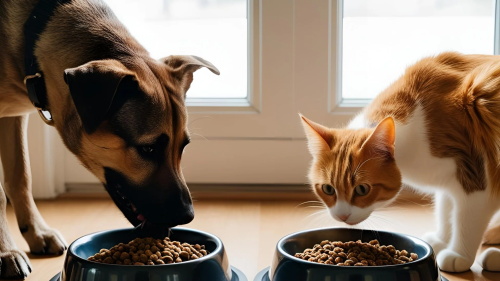The Impact of Feeding Schedules on Pet Health and Behavior

Feeding your pet is one of the most fundamental aspects of pet care, yet the impact of mealtimes and regularity on a pet's overall health, behavior, and emotional well-being is often underestimated. Whether you own a dog, cat, or other companion animal, the way and timing of meals can have profound effects that go far beyond simply filling their stomachs. Establishing a consistent feeding schedule isn't just a matter of convenience; it's a crucial step in promoting your pet's long-term health, stability, and happiness.
The Science Behind Feeding Schedules
Like humans, animals possess complex internal biological clocks that control their physiological processes. These circadian rhythms influence a wide range of functions, from hormone production and sleep-wake cycles to metabolism and digestion. For pets, these clocks are highly sensitive to environmental factors such as light, temperature, and, crucially, food availability.
When pets eat at consistent times, their internal clocks adjust accordingly. This synchronization ensures optimal timing for digestive enzymes, bile secretion, and nutrient absorption, improving overall health. Conversely, irregular feeding disrupts these natural rhythms, potentially leading to digestive issues, anxiety, and other behavioral problems.
An interesting example is how cats and dogs anticipate mealtime. Many pet owners notice that their pets become more alert, active, and even vocalize when feeding time approaches. This behavior isn't just a sign of hunger; it indicates that their pet's biological clock is aligned with their daily rhythm, highlighting the importance of maintaining a consistent feeding schedule.
Health Benefits of Consistent Feeding
1. Improved Digestion and Nutrient Absorption
Regular feeding intervals can significantly improve your pet's digestive efficiency. For dogs, regular feedings stimulate the timely release of digestive enzymes and bile, helping to break down food and absorb essential nutrients. This can prevent gastrointestinal discomfort, bloating, or diarrhea, which are common in pets fed regularly.
Cats, as obligate carnivores, are particularly sensitive to feeding patterns. In the wild, cats typically eat small, multiple meals throughout the day. Providing regular, well-spaced meals mimics this natural behavior, ensuring proper digestion and preventing potentially life-threatening conditions such as hepatic steatosis (a liver disease that occurs when cats go without food for extended periods).
2. Weight Management and Obesity Prevention
Obesity is one of the fastest-growing health problems among pets, with serious consequences including diabetes, arthritis, heart disease, and a shortened lifespan. One key strategy for preventing obesity is to manage portion size and frequency through a regular feeding schedule.
Scheduled feeding allows owners to precisely monitor their pet's food intake. Unlike free-feeding, where food is available throughout the day, scheduled feeding reduces the risk of overeating and promotes a healthier weight. For active dogs, a regular feeding schedule helps maintain energy levels for exercise and play, while sedentary pets benefit from portion control to prevent gradual weight gain.
3. Behavioral Stability
Pets, especially dogs, appreciate routine. Just like children, animals appreciate a routine. A regular feeding schedule not only benefits physical health but also promotes emotional and behavioral stability.
Dogs with regular mealtimes are less likely to exhibit anxiety-related behaviors, such as excessive barking, destructive chewing, or restlessness. Similarly, when cats know when they can eat, they experience less stress and become calmer and more confident. Regular mealtimes also aid in housetraining puppies, as linking feeding times to toileting helps them develop proper elimination habits more quickly.
Behavioral Impacts of a Feeding Schedule
1. Reduces Anxiety and Stress
Pets are creatures of habit, and uncertainty can cause them stress. Irregular feeding times can make pets anxious, leading to undesirable behaviors such as pacing, barking, or searching for food. Conversely, regular feeding times can provide pets with a sense of control and security, which can reduce anxiety and enhance their well-being. Calm pets are generally happier and healthier, and regular feeding is a simple and effective way to foster this state.

2. Strengthens Training and Focus
Predictable feeding routines improve a pet's responsiveness during training. Pets quickly learn to associate structured activities, including mealtimes, with positive outcomes. By making regular meals part of training sessions, owners can more effectively motivate their pets. For example, giving pets small treats as rewards during training sessions can reinforce good behavior and strengthen the bond between pet and owner.
3. Preventing Behavioral Problems
Inconsistent feeding can inadvertently encourage undesirable behaviors, such as food guarding, begging, or aggression. Pets may become anxious about when food will be available, leading to overly enthusiastic or defensive behavior. By setting predictable feeding times, pets learn that food is reliably available, reducing the need to fight for food or display aggression.
Customize your pet's feeding schedule based on their individual needs
Not all pets are the same, and feeding schedules should be tailored to their age, breed, health, and activity level. Here are some guidelines:
Puppies and Kittens: Young pets require frequent feedings to accommodate their rapid growth and high energy needs. Three to four meals per day are generally recommended during their early years, gradually reducing feeding frequency as they mature.
Adult Dogs and Cats: Most adult pets thrive on two evenly spaced meals per day. However, some animals with specific medical conditions may benefit from smaller, more frequent feedings.
Senior Pets: Older pets may experience changes in their metabolism or digestive efficiency. Feeding schedules should be adjusted accordingly, and monitoring weight and overall health becomes increasingly important.
Pets with certain medical conditions, such as diabetes or gastrointestinal disorders, may require special feeding regimens. Consulting with a veterinarian is crucial to determine the best feeding schedule for these pets.
Practical Tips for Implementing a Feeding Plan
Creating a consistent feeding schedule requires commitment, but it's relatively simple with the following steps:
Set a specific time: Feed your pet at the same time each day. Maintaining consistency is key to establishing a routine and establishing expectations.
Measure portions carefully: Use measuring cups or a food scale to ensure your pet receives the correct amount.
Avoid random feeding: Leaving food out all day can lead to overeating, obesity, and digestive issues. Feeding at scheduled times is a safer and healthier option.
Monitor Weight and Health: Track your pet's weight and overall health. Adjust feeding size or frequency as needed based on activity level and life stage.
Provide a quiet environment: Feeding should be a positive experience. Ensure the feeding area is quiet and safe, free from stress or competition from other pets.
Consult your veterinarian: A veterinarian can help you design a feeding schedule tailored to your pet's specific nutritional and health needs.
The Real-Life Impact of a Feeding Schedule
Many pet owners report significant improvements in their pets' behavior and health after implementing a regular feeding routine. Dogs may become calmer, more focused, and easier to train, while cats often reduce stress-related behaviors such as excessive grooming or vocalizing. Even pets with pre-existing digestive issues experience less stomach upset and more regular bowel movements with a regular feeding schedule.
Consistency also strengthens the bond between humans and animals. Pets learn to trust their caregivers to attend to them on schedule, fostering mutual affection, trust, and understanding.
A feeding schedule is more than just a simple daily chore; it's the cornerstone of responsible pet care. Regular mealtimes support a pet's physical health by promoting digestion, nutrient absorption, and weight management; they also promote emotional well-being by reducing anxiety, enhancing training effectiveness, and preventing behavioral issues. By understanding the science behind feeding habits and tailoring a feeding schedule to their pet's individual needs, pet owners can provide their pets with routine, stability, and security. This, in turn, helps pets and owners live happier, healthier, and more harmonious lives.
The benefits of a well-structured feeding schedule are numerous and far-reaching. By adhering to a regular feeding schedule, pet owners can help their pets not only survive, but thrive. A simple yet thoughtful mealtime routine is an investment in your pet's overall quality of life, improving not only their health and behavior but also fostering a lasting bond between human and animal.



